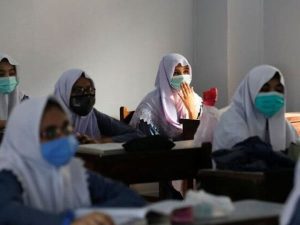UN refugee agency chief Filippo Grandi began a three-day visit to Peshawar on Sunday, where he met with Afghan refugees and asylum seekers to discuss their problems, Pakistan’s repatriation plan, and the resettlement of Afghans in other countries, a UNHCR spokesperson said.
Spokesperson Qaisar Afridi said that Grandi, the United Nations High Commissioner for Refugees (UNHCR), met delegations of Afghan refugees who shared their challenges in Pakistan. “The UNHCR chief assured Afghan refugees that he would discuss all their issues with Pakistani officials,” Afridi said.
The Afghan delegation included both registered refugees and those who arrived in Pakistan after the Taliban takeover in August 2021.
Grandi also met Minister for States and Frontier Regions (SAFRON) Amir Muqam in Peshawar, according to the minister’s office in Islamabad. The SAFRON ministry handles Afghan refugee affairs.
“Pakistan has been hosting Afghan refugees for 40 years despite serious economic difficulties,” the SAFRON minister told Grandi, as quoted in an official statement.
This is Grandi’s first visit to Pakistan since the country announced a repatriation plan for “illegal foreigners” in October last year. The Taliban government in Afghanistan strongly opposed Pakistan’s decision to expel undocumented Afghans and called for the operation to halt.
Since November 1, 2023, nearly 500,000 Afghans without legal documents have been repatriated to Afghanistan, with officials stating that about 1.7 million illegal Afghans remain in Pakistan.
“The refugee issue is becoming more complicated worldwide. Conflicts are leading to refugee crises, and attention must be paid to resolving these conflicts,” Minister Muqam told the UNHCR chief.
Grandi’s delegation praised Pakistan for its long-term support of Afghan refugees, the statement added.
On Monday, the UNHCR delegation will hold formal talks in Islamabad as part of Grandi’s visit.
The UNHCR has expressed concerns over Pakistan’s directive for undocumented foreigners to leave, as this policy also affects registered Afghan refugees and those with valid documents.
However, Afghan Refugee Commissioner Abbas Khan denied media reports that Pakistan has started deporting those with Afghan Citizen Cards (ACC).
According to UNHCR data, there are over 800,000 ACC holders. Abbas Khan stated that decisions regarding ACC holders will be made in consultation with all stakeholders, including Afghanistan and the UNHCR.
Pakistan issued ACC cards to undocumented Afghans in 2017. The UNHCR estimates that there are 1.3 million registered Afghans holding Proof of Registration (PoR) Cards.
Officials report that nearly 700,000 Afghans have arrived in Pakistan since the Taliban takeover in August 2021. While most sought to settle in third countries, around 75,000 have relocated elsewhere.














